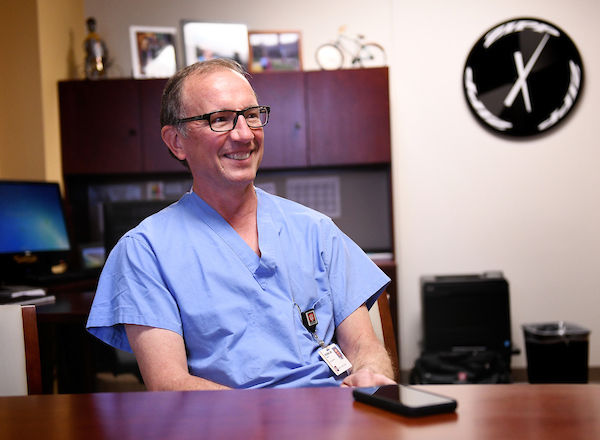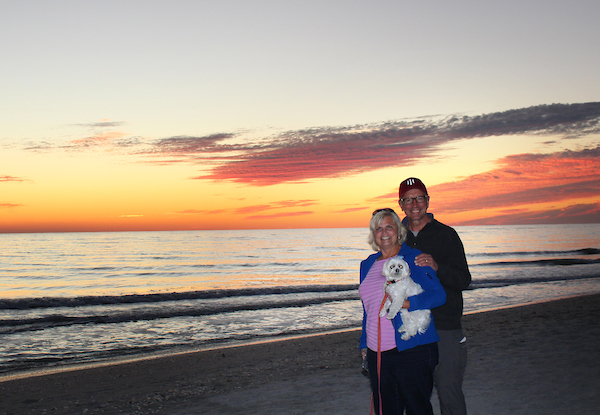It was a quiet fall Sunday afternoon on trails buried back in the woods with no one around. Larry Stevens, M.D., was riding his mountain bike.
He was a diehard cyclist, passionate about all kinds of cycling. Road, mountain, even cyclo-cross, a form of extreme racing over trails, grass, steep hills and pavement.
But on this day in 2014, something went wrong. Dr. Stevens went for a jump and flipped over the handlebars.
“Next thing I know, I wake up on the ground, blood pouring down my face,” says Dr. Stevens, the medical director of surgery at IU Health Methodist Hospital. “I had this intense pain in my neck and head.”
But no one was around to help. So, Dr. Stevens hopped back on his bike, rode out of the trails and drove himself to the hospital.
There, he received unthinkable news.
He had suffered a concussion, nasal fracture and nasal laceration. But, most severely, Dr. Stevens had a spinal cord injury to the C4 vertebrae. Most people with that injury need 24-hour round the clock breathing support. Most are paralyzed.
 “So, it’s miraculous, an incredible blessing I’m not a quadriplegic right now because it broke in four different places,” Dr. Stevens says. “Somehow, all the pieces stayed where they were and didn’t impinge on the spinal canal.”
“So, it’s miraculous, an incredible blessing I’m not a quadriplegic right now because it broke in four different places,” Dr. Stevens says. “Somehow, all the pieces stayed where they were and didn’t impinge on the spinal canal.”
They remained intact even as he rode out of those woods, even as he drove to the hospital.
“It is a miracle,” Dr. Stevens says, “absolutely.”
He is sitting in his office at Methodist, talking about how he’s given up mountain biking and cyclocross. But he still loves to ride, mostly the road variety of cycling.
Dr. Stevens’ other passion is evident in the career he chose and the way he talks about it. That passion is helping people. Dr. Stevens is a surgeon. He started out in abdominal transplant, but after five years moved to laparoscopic surgery.
Fifty percent of his time now is spent on administrative duties as Methodist’s operating room director, leading 400 employees, more than 100 surgeons and 100 anesthesiologists. He is also one of the medical co-directors for quality with IU Health Physicians. And, a few months ago, he joined the board of directors at IU Health.
But Dr. Stevens still insists on caring for patients and he still spends about half his time in the operating room, performing mostly gall bladder, hernia and hiatal surgeries.
“You truly get to help people and make a difference in the world,” says Dr. Stevens, the married father of three grown children. “Always remember why you started in the first place. It’s about caring for others.”
***
Dr. Stevens grew up in a tiny town called Crandall, Ind. At the last U.S. Census, the population was 152 people.
As a farm kid, he milked cows, baled hay, planted crops and helped the neighbors on their farms, too.
The oldest brother to one sister, Dr. Stevens played a lot of sports, but he was mostly a bench warmer. He was the first in his family to go to college.
His grandfather dropped out of school after eighth grade to work on the family farm. His dad was a smart man, but never had the opportunity to go beyond high school. He worked as a farmer part time and was a paralegal in Louisville, commuting to the city each day.
And Dr. Stevens was on his way to following in the family farming footsteps, with plans to go to Purdue University for an agriculture degree.
Until something fascinating happened.
The area the Stevens family lived in was so rural, there was no ambulance service.
 “So, literally, without exaggeration, if you were in an accident the hearse from the funeral home would come pick you up to take you to the hospital,” says Dr. Stevens, “because it was the only vehicle in the county that somebody could lie down in.”
“So, literally, without exaggeration, if you were in an accident the hearse from the funeral home would come pick you up to take you to the hospital,” says Dr. Stevens, “because it was the only vehicle in the county that somebody could lie down in.”
When Dr. Stevens’ neighbor started a volunteer rescue squadron to go to accident scenes and stabilize victims until the hearse could arrive, his dad highly encouraged him to be part of that squad.
As Dr. Stevens puts it, “dad voluntold me to participate in the rescue squadron and do something productive with myself.”
So, he went to high school classes during the day and EMT school at night.
“I discovered I had a passion for it,” he says. “I withdrew my application from Purdue and submitted an application to IU to go the pre-med route.”
Dr. Stevens likes to joke he has “one of the most boring resumes on the planet.”
He went to school at Indiana University for both his undergraduate degree and medical school. He did his residency in general surgery at Methodist, when the hospital had its own residency program.
He spent a couple of years at the University of Chicago for a transplant surgery fellowship and then came back to Indianapolis. He started at Methodist in 1991 and has been here since.
His philosophy on treating patients:
“You talk about bedside manner, but it’s really more than that. It’s how you relate to people. Is this simply a technical exercise? Or are you caring for the person?” Dr. Stevens says. “People trust you to do this. People are granting you incredible privilege to insert yourselves into their lives and, ultimately, help them. So, it’s less about bedside manner and more about trying to build a relationship.”
Advice for new surgeons:
“What I tell anyone in healthcare is healthcare’s tough. It’s constantly changing. But it’s still incredibly important and an incredibly rewarding profession,” he says. “You truly get to help people and make a difference in the world. When you get discouraged, remember why you started in the first placed. It’s about caring for others.”
More With Dr. Stevens
 Personal: He is married to Jilaine, whom he met at Methodist when he was an intern and she was a nursing student. She now works at the hospital in the pre-admission testing area. Dr. Stevens has one son, Adam, from a previous marriage. He and Jilaine have two children, daughter Taylor, 24, a sophomore medical student at IU; and son Austin, 22, a mechanical engineering major at the University of Mississippi.
Personal: He is married to Jilaine, whom he met at Methodist when he was an intern and she was a nursing student. She now works at the hospital in the pre-admission testing area. Dr. Stevens has one son, Adam, from a previous marriage. He and Jilaine have two children, daughter Taylor, 24, a sophomore medical student at IU; and son Austin, 22, a mechanical engineering major at the University of Mississippi.
Hobbies: Cycling, salt-water fishing and reading. He and his wife are both foodies. Dr. Stevens once took a weeklong cycling vacation in northern Italy. There was also a time he fancied himself a race car driver. He and Jilaine love Sanibel Island and just purchased a home there. They have a Maltese dog named Ellie.
Favorite quote from a patient: A man came in who, in his lifetime, had been in a motorcycle crash and broken his leg and had fallen from a cliff and broken his shoulder. Dr. Stevens told him,
“My, you’ve had a rough time.” “He looked at me and said, ‘Doc I would rather wear out than rust out,’” Dr. Stevens says. “That’s a great philosophy. Live life instead of sitting around.”
— By Dana Benbow, Senior Journalist at IU Health.
Reach Benbow via email dbenbow@iuhealth.org or on Twitter @danabenbow.
